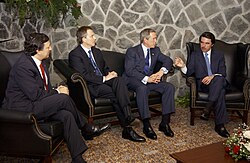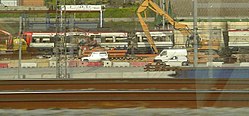14 March 2004 | |||||||||||||||||||||||||||||||||||||||||||||||||||||||||||||||||||||||||||||||||||||||||||||||||||||
All 350 seats in the Congress of Deputies and 208 (of 259) seats in the Senate 176 seats needed for a majority in the Congress of Deputies | |||||||||||||||||||||||||||||||||||||||||||||||||||||||||||||||||||||||||||||||||||||||||||||||||||||
|---|---|---|---|---|---|---|---|---|---|---|---|---|---|---|---|---|---|---|---|---|---|---|---|---|---|---|---|---|---|---|---|---|---|---|---|---|---|---|---|---|---|---|---|---|---|---|---|---|---|---|---|---|---|---|---|---|---|---|---|---|---|---|---|---|---|---|---|---|---|---|---|---|---|---|---|---|---|---|---|---|---|---|---|---|---|---|---|---|---|---|---|---|---|---|---|---|---|---|---|---|---|
| Opinion polls | |||||||||||||||||||||||||||||||||||||||||||||||||||||||||||||||||||||||||||||||||||||||||||||||||||||
| Registered | 34,571,831 | ||||||||||||||||||||||||||||||||||||||||||||||||||||||||||||||||||||||||||||||||||||||||||||||||||||
| Turnout | 26,155,436 (75.7%) | ||||||||||||||||||||||||||||||||||||||||||||||||||||||||||||||||||||||||||||||||||||||||||||||||||||
| |||||||||||||||||||||||||||||||||||||||||||||||||||||||||||||||||||||||||||||||||||||||||||||||||||||
| |||||||||||||||||||||||||||||||||||||||||||||||||||||||||||||||||||||||||||||||||||||||||||||||||||||
A general election was held in Spain on Sunday, 14 March 2004, to elect the members of the 8th Cortes Generales under the Spanish Constitution of 1978. All 350 seats in the Congress of Deputies were up for election, as well as 208 of 259 seats in the Senate. It was held concurrently with a regional election in Andalusia.
Contents
- Background
- Overview
- Electoral system
- Eligibility
- Election date
- Outgoing parliament
- Parties and candidates
- Campaign
- Party slogans
- Madrid train bombings
- Opinion polls
- Voter turnout
- Results
- Congress of Deputies
- Senate
- Maps
- Aftermath
- Government formation
- Notes
- References
- Bibliography
- External links
Since 2000, the ruling People's Party (PP) had governed with an absolute majority in the Congress of Deputies which allowed it to renegue from its previous agreements with peripheral nationalist parties. This period saw sustained economic growth, but the controversial management—and, at times, attempted cover-up—of a number of crises affected Aznar's government standing and fostered perceptions of arrogance: this included the "Gescartera case", the Prestige oil spill and the Yak-42 crash. A reform of unemployment benefits led to a general strike in 2002, and the unpopular decision to intervene in the Iraq War sparked massive protests across Spain. The incumbent prime minister, José María Aznar, had renounced to seek a third term, being replaced as party candidate by the first deputy prime minister, Mariano Rajoy.
The electoral outcome was heavily influenced by the Madrid train bombings on 11 March, which saw Aznar's government blaming the Basque separatist ETA for the attacks in spite of mounting evidence suggesting Islamist authorship. The ruling PP was accused by the opposition of staging a disinformation campaign to prevent the blame on the bombings being linked to Spain's involvement in Iraq. Results saw the opposition Spanish Socialist Workers' Party (PSOE) under new leader José Luis Rodríguez Zapatero securing an unprecedented 11 million votes, with a net gain of 39 seats up to 164, whereas the PP (which had been predicted by opinion polls to secure a diminished but still commanding victory) lost 35 seats in the worst defeat for a sitting Spanish government up to that point since 1982. Republican Left of Catalonia (ERC) benefitted from the impact of the "Carod case"—the revelation that party leader Josep-Lluís Carod-Rovira had held a meeting with ETA shortly after joining the new Catalan regional government of Pasqual Maragall—which gave the party publicity to the detriment of Convergence and Union (CiU). The 75.7% voter turnout was among the highest since the Spanish transition to democracy, with no subsequent general election having exceeded such figure. The number of votes cast, at 26.1 million votes, remained the highest figure in gross terms for any Spanish election until April 2019. [1] [2] [3]
The election result was described by some media as an "unprecedented electoral upset". [4] Perceived PP abuses and public rejection at Spain's involvement in Iraq were said to help fuel a wave of discontent against the incumbent ruling party, with Aznar's mismanagement of the 11M bombings serving as the final catalyst for change to happen. [5] [6] Zapatero announced his will to form a minority PSOE government, seeking the parliamentary support of other parties once elected. [7]






























